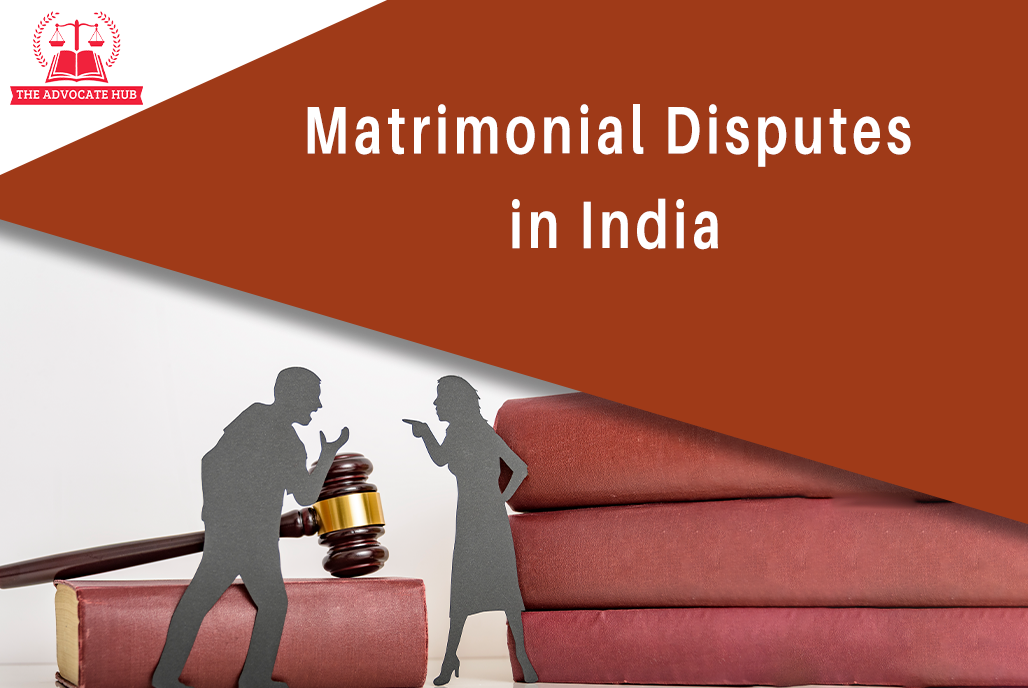Marital disputes are a complex and often emotionally charged aspect of family life. These come with their set of cultural, social, and legal intricacies in India. Any person navigating through this challenging terrain must understand these disputes, the legal framework governing divorce, the grounds for seeking a divorce, the judicial separation concept as well as ways to settle these without going to court. This article therefore aims at giving a comprehensive guide on these aspects.
Matrimonial Disputes
Matrimonial disputes cover a wide range of issues that can emerge between partners and usually bring about considerable emotional distress and psychological pressure; such quarrels may arise from:
- Infidelity and Trust Issues: Once trust is destroyed by acts of infidelity, the relationships can experience tensions as well as, in some instances, total dissolution of the relationships.
- Financial Disagreements: An untrusting climate due to cheating or other reasons will put a distance between the two partners.
- Incompatibility: Married partners may hence come across a host of issues in personality, interests, or goals in life that are opposed to the other, thus resulting in friction and conflict.
- Domestic Violence: Spousal abuse in terms of physical, emotional, or psychological nature is a serious complication that mostly requires the intervention of law. Due to domestic violence, a woman might need to file for a divorce when the marriage is irretrievably broken.
- Family Interference: Evaluating the part of the kinship organization of more numerous Indian families in marital relations is significant. They can also cause disputes and trigger problems that are already there, even when they are not intervening directly in family affairs.
It is vital to handle such matters through legal measures, counseling, and even applying the use of alternative dispute resolution methods.
Divorce in India
Divorce is the legal dissolution of a marriage by a court or other competent body. In India, divorce laws are diverse and vary based on the religion of the parties involved. The primary legal frameworks governing divorce in India include:
- Hindu Marriage Act, 1955: This Act exists for Hindus, Buddhists, Jains, and Sikhs. It specifies the grounds for divorce and the route out that should be followed in the law courts.
- Muslim Personal Law (Shariat) Application Act, 1937: This Act concerns Muslims and includes some provisions of Islamic law regarding marriage and divorce.
- Christian Marriage Act, 1872, and Divorce Act, 1869: It is these Acts that regulate Christians and offer the legal requirements in marriage and divorce.
- Parsi Marriage and Divorce Act, 1936: This Act concerns Parsis and includes the under-listed issues on divorce; the grounds and the procedure.
- Special Marriage Act, 1954: This act provides a civil coding for inter-religion and civil marriages and; marriage and divorce.
Both of these laws describe certain processes and the circumstances under which a divorce is possible, taking into account the rights of the spouses.
Methods to Settle Matrimonial Cases Outside of Court
Out-of-court ways to resolve matrimonial disputes have the advantage of; respect for relations, time, and cost. The primary methods for settling matrimonial cases outside of court include: The primary methods for settling matrimonial cases outside of court include:
- Mediation:
- In mediation, there is the presence of an independent person who assists the spouses in negotiating to come to a consensus on the matter in dispute.
- Some of these include; child custody, division of property, and even maintenance.
- It is not an obligatory legal action where the mediator does not make a final decision but assists the parties reach an agreement.
- Conciliation:
- Another process in arbitration is called conciliation and it slightly differs from mediation as the conciliator also can suggest the solutions to the arisen disputes.
- It is mostly applied in the family court as a reference before trial.
- A conciliator in most cases facilitates the process by trying to find out the problem areas in the dispute and possible options of solving the dispute.
- Arbitration:
- Arbitration is not frequently used in matrimonial claims but can be applied when it concerns specific questions of division of marital property.
- In arbitration, the parties agree to let the arbitrator decide on the matter, and his/her decision is final.
- This method is preferably applied where the two parties accept the side of the arbitrator.
- Collaborative Law:
- Collaborative law means that both spouses and their attorneys agree not to litigate the case.
- This process is comprised of negotiation and problem-solving.
- Collaboration is particularly helpful when there are several contentious matters to address, and all the parties wish to solve them without necessarily going to court.
- Counseling:
- Marital counseling entails guidance of the couple, where in most cases, it can assist in solving the conflict and may at times even avoid a divorce.
- Marital counselors facilitate the process of focusing on the root causes of marital problems in the couple.
- Treatment is also a powerful mechanism during the divorce process and after the divorce so people can deal with the emotional side of it.
Grounds of Divorce
The grounds for divorce in India vary depending on the personal laws applicable to the individuals. Common grounds across most laws include:
- Adultery:
- This is the case where one of the two partners or spouses indulges in sexual intercourse outside marriage or with a third partner.
- Adultery must be proven, and this can sometimes be a really difficult task to prove in a court of law.
- Cruelty:
- Physical and mental cruelty are some of the grounds for divorce as per the act.
- An act of physical violence, and emotional abuse as well as mental harassment can be referred to as cruelty.
- Here the extent and the nature of the alleged cruelty by one spouse on the other is considered by the court.
- Desertion:
- The basis of desertion entails the action of one of the spouses who forsakes the other and without any proper cause for the duration spanned by two years or more.
- The deserted spouse may want to divorce on this ground.
- Conversion:
- Divorce can also be based on religious conversion, and the other party will be expected to follow the new religion or be thrown out.
- Any change in religion by either of the spouses and if the other spouse does not want to continue being in the marriage, a divorce can be initiated.
- Mental Disorder:
- Psychiatric disorder that entails a wife or husband being unable to continue being married could also be a legal basis for divorce.
- It has to be such that the relationship between the couple is affected considerably due to the presence of the disorder.
- Communicable Disease:
- Even if that disease is severe, and proves to be non-curable and communicable, it becomes a ground for divorce if a spouse is suffering from it.
- The disease must be of a nature that is threatening to the other spouse.
- Renunciation of the World:
- Another reason recognized by law is when one of the spouses disagrees with the other and refuses to be together and decides to become a monk or a nun.
- Quite a number of these are applicable only in some religious settings.
- Not Heard Alive:
- Absence where no information of the living of the other spouse has been received by the other spouse can also be a ground for divorce provided the period of absence has been seven years and above.
- This ground is based on the consideration of death presumptions’ after a long time of disappearance.
Judicial Separation
Marital separation demands the legal separation of couples but does not lead to the dissolution of marriage as anticipated in the case of divorce. It can allow for renewal of the marriage or a sort out of marital dispute. Key aspects of judicial separation include:
- Legal Recognition:
- Legal separation on the other hand is legal and does not dissolve the marriage but it separates the parties physically.
- The couple continues being legally married but they lack the mandate to force each other into continuing to live together.
- Grounds:
- The grounds for a judicial separation include cruelty, abandonment, adultery, etc as in the case of the divorce.
- Like divorce, judicial separation can be claimed on any of the grounds recognized and allowed by the law.
- Financial Support:
- Orders regarding maintenance, child custody, and financial arrangements can be made during judicial separation.
- The court can provide directions for the financial support of the spouse and children.
- Reconciliation:
- Judicial separation can act as a cooling-off period, potentially leading to reconciliation or a decision to proceed with divorce.
- It provides the couple with time to reflect on their relationship and consider possible reconciliation.
Conclusion
Marital matters are complicated and when it comes to Indian laws, it becomes very important to know the rights and options that are available for the solutions. Divorce, being of several types, is a legal option to dissolve a marriage, and judicial separation creates the possibility for the couple to take time off from a continuing marital conflict. Except judicial methods such as litigation, other related procedures including, mediation, conciliation, arbitration, and collaborative law are efficient ways for the settlement of disputes. It is also good to note that counseling can also be of productive use in helping the couple explain their problems and relate well.
Those who are in a situation concerning some marital problems should consult the best lawyer, and where possible, consult as many lawyers as possible to get all the possible solutions to the problems. The legal framework of India offers different remedies to deal with matrimonial issues and settle conflicts for the benefit of both spouses. For more information and professional legal assistance, visit The Advocate Hub.
Disclaimer
The advocatehub.com is not responsible for the accuracy of the content.

